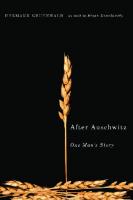History and Memory after Auschwitz 9781501727450
The relations between memory and history have recently become a subject of contention, and the implications of that deba
146 49 18MB
English Pages 232 [227] Year 2018
Note
CONTENTS
Acknowledgments
Introduction
CHAPTER ONE. History and Memory: In the Shadow of the Holocaust
CHAPTER TWO. Revisiting the Historians' Debate: Mourning and Genocide
CHAPTER THREE. Rereading Camus's The Fall after Auschwitz and with Algeria
CHAPTER FOUR. Lanzmann's Shoah: "Here There Is No Why"
CHAPTER FIVE. 'Twas the Night before Christmas: Art Spiegelman's Maus
CHAPTER SIX. Conclusion: Psychoanalysis, Memory, and the Ethical Tum
Index
Recommend Papers

- Author / Uploaded
- Dominick LaCapra
File loading please wait...
Citation preview
HISTORY AND MEMORY AFTER AUSCHWITZ
OTHER WORKS BY DOMINICK LACAPRA
Emile Durkheim: Sociologist and Philosopher History and Criticism History, Politics, and the Novel Madame Bovary on Trial A Preface to Sartre Representing the Holocaust: History, Theory, Trauma Rethinking Intellectual History: Texts, Contexts, Language Soundings in Critical Theory The Bounds of Race: Perspectives on Hegemony and Resistance edited Modern European Intellectual History: Reappraisals and New Perspectives edited with Steven L. Kaplan
HISTORY AND MEMORY
AFTER AUSCHWITZ DOMINICK LACAPRA
CORNELL UNIVERSITY PRESS ITHACA AND LONDON
Copyright© 1998 by Cornell University All rights reserved. Except for brief quotations in a review, this book, or parts thereof, must not be reproduced in any form without permission in writing from the publisher. For information, address Cornell University Press, Sage House, 512. East State Street, Ithaca, New York 14850. First published 1998 by Cornell University Press First printing, Cornell Paperbacks, 1998
Ubrary of Congress Cataloging-in-Publication Data LaCapra, Dominick, 1939- . History and memory after Auschwitz I Dominick LaCapra p. em. Includes bibliographical references and index. ISBN-13: 978-o-8o14-84'}6-4 (pbk. : alk. paper) ISBN-10: o-8o14-8496-o (pbk. : alk. paper) 1. Holocaust, Jewish (1939-1945)-Historiography. 2. Holocaust, Jewish (1939-1945)-Psychological aspects. 3· Holocaust, Jewish h939-1945)-Influence. I. Title. D8o4.348.L33 1998 940·5J'18-dC2.1 97-41845 Cornell University Press strives to use environmentally responsible suppliers and materials to the fullest extent possible in the publishing of its books. Such materials include vegetable-based, low-VOC:: inks and acid-free papers that are recycled, totally chlorine-free, or partly composed of nonwood fibers. For further information, visit our website at www.cornellpress.cornell.edu. Paperback printing 10 9 8 7 6 5 4
For Jane
For me, ethics and aesthetics are associated with the word essay. It is said to come from "weighing," and is mostly used by scholars only to characterize the smaller excrescences, those not written with full commitment, of their life's work; it is also called "attempt." I can also make use of it in this latter sense, to which, however, I would like to give a different content. Is the essay something left over in an area where one can work precisely [in the sense of the natural sciences] .... Or: the strictest form attainable in an area where one cannot work precisely. I will seek to demonstrate the second sense. Now, a rational course of thought can be true or false, as can an affective one, but aside from that it "speaks to us" or doesn't speak to us. And there are trains of thought that really work only through the mode of feelings. For a person who has no ear for them they are completely confusing and incomprehensible. But here it is nevertheless visibly a matter of an entirely legitimate means of understanding, even if it is not of binding general validity. The number of such ways of reaching understanding among people is, moreover, greater than assumed (chimpanzee couples, effect of a leader through charisma, etc.). Even the individual person has the experience that the same thought can be dead for him at one time, a mere series of words, alive at another. Robert Musil, fragment ["On the Essay" 1914?]
~
CONTENTS
Acknowledgments ix Introduction 1
CHAPTER ONE
History and Memory: In the Shadow of the Holocaust 8 CHAPTER TWO
Revisiting the Historians' Debate: Mourning and Genocide
43 CHAPTER THREE
Rereading Camus's The Fall after Auschwitz and with Algeria 73 CHAPTER FOUR
Lanzmann's Shoah: "Here There Is No Why" 95 CHAPTER FIVE
'Twas the Night before Christmas: Art Spiegelman's Maus
139 CHAPTER SIX
Conclusion: Psychoanalysis, Memory, and the Ethical Tum 180
Index 211
~
ACKNOWLEDGMENTS
A version of chapter 2 appeared in History & Memory, and a version of chapter 4 in Critical Inquiry. The other chapters are published here for the first time. For their reading and response to Chapter 4, I would like to thank members of a workshop on psychoanalysis at Cornell (especially David Bathrick, Brett deBary, Nelly Furman, Mary Jacobus, Biddy Martin, Tim Murray, David Rodowick, Suzanne Stewart, and Nancy Wood) as well as the participants at the 1996 session of the School of Criticism and Theory. I thank Michael Roth for his reading of the entire manuscript and for his insightful comments. I would particularly like to thank Geoffrey Hartman both for his reading of the manuscript and for his carefully reasoned and eloquent response to Chapter 4 when it was presented at a typically engaging and argumentative colloquium of the School of Criticism and Theory. For their reactions to a number of the essays in this book, I thank Ben Brower, Leigh Ann Eubanks, Adam Hoffman, Tracie Matysik, Kathleen Merrow, Richard Schaefer, Judith Surkis, and Jeremy Varon. I also thank Kathleen Merrow for her assistance in gathering materials for Chapter 5, and Tracie Matysik for her assistance in preparing the index. For her reading of the manuscript and her many helpful comments, I am (as always) grateful to Jane Pedersen. Finally, I thank Grey Osterud for carefully reading and copyediting the manuscript. D. LAC.
ix
HISTORY AND MEMORY AFTER AUSCHWITZ
Introduction
The problem of memory has recently become a preoccupation of historians and critical theorists. A journal, History & Memory, is even devoted to the topic, and Pierre Nora has edited a multivolume study of memory sites. 1 But the relations between memory and history have still to be sorted out, and exceptionally vexed is their import for aesthetic, ethical, and political issues. What aspects of the past should be remembered and how should they be remembered? Are there phenomena whose traumatic nature blocks understanding and disrupts memory while producing belated effects that have an impact on attempts to represent or otherwise address the past? What, in general, is the significance of trauma in history? Do some events present moral and representational issues even for groups not directly involved in them? Do those more directly involved have special responsibilities to the past and the way it is remembered in the present? Can-or should-historiography define itself in a purely scholarly and professional way that distances it from public memory and its ethical implications? Should it, on the contrary, ground itself in memory as its matrix and muse? Or is there a more complex and nuanced interaction between history and memory? Does art itself have a special responsibility with respect to traumatic events that remain invested with value and emotion? I hope to shed some light on these questions, for my fo1 Les /ieux de memoire (Paris: Gallimard, 11}134). Translated as Realms of Memory, ed. Lawrence I
![In Pursuit of German Memory: History, Television, and Politics after Auschwitz [1 ed.]
9780821441596, 9780821416389](https://ebin.pub/img/200x200/in-pursuit-of-german-memory-history-television-and-politics-after-auschwitz-1nbsped-9780821441596-9780821416389.jpg)






![After Auschwitz: One Man's Story [1 ed.]
9780773560369, 9780773532427](https://ebin.pub/img/200x200/after-auschwitz-one-mans-story-1nbsped-9780773560369-9780773532427.jpg)

